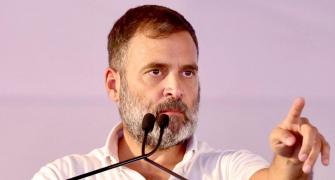
The celebrated German novelist and poet always wrote against the grain and, as his poem on Israel and Iran shows, he was ready even to take on Germany's collective guilt over the Holocaust
Germany's ‘conscience keeper’, Günter Grass, is no more. He was one of those thinkers who rattled the general sense of political correctness in Germany by his poetic outbursts.
The Nobel laureate was well known for his candid and provocative formulations on several political and social issues. He always considered himself a non-partisan political author.
His inopportune remarks at times caused embarrassment among the political and diplomatic circles. In the 1960s, he campaigned for the Social Democratic Party but later withdrew from the party because of disagreements over its asylum policies.
There is, however, a blot attached to his biography, which provided for a controversy in 2006, and which his adversaries used as an offensive to denigrate him. Grass confessed in his autobiography to being a member of Hitler's dreaded Waffen SS (‘Protection Squadron’) as a 17-year-old towards the end of World War II.
This remained, as he said, one ‘residual blemish’ that haunted him throughout his life. During one of his several visits to India in the 1970s, he was invited to JawaharlalNehruUniversity, where I interviewed him. The students intervened and confronted him with his membership of the SS. He openly admitted that it was due to the naivete of his adolescence.
He also created a controversy in India by writing a travelogue, ‘Tongue Showing’ (1988), diarising the experiences of his stay in West Bengal with bizarre descriptions of poverty and squalor of the slums and public life of Kolkata.
Grass wrote a poem, ‘What Must Be Said’, in 2012 about the strained relations between Israel and Iran. He accused Israel of threatening Iran with a preventive nuclear strike and endangering world peace. This sparked sharp reactions in diplomatic and political circles and unleashed vociferous public debates in Germany and elsewhere in Europe.
"The atomic power Israel is endangering the already fragile world peace," declared Grass in his poem, which appeared a few years ago in a German and an Italian newspaper. In the light of the current US-Iran nuclear deal, this poem may get a new dimension.
His poem has a different character. One has to understand the historical background of the present day German mindset. Against this background the poem gets its ideological dimension. It has conjured up the spectre of old memories of anti-Jewish animosities of the Hitler era.
After World War II, certain taboos have been ingrained in the German psyche and consequently in their political behaviour. The Germans avoid making any negative public statement against Israel because of the ‘collective guilt’ over the Jewish genocide perpetrated by the Nazis.
This sense of guilt burdens the German mind even 70 years after World War II. Therefore, any criticism of Israel or any oblique remark about the Jews is often seen as anti-Semitism.
A laughable example of an inverted philosemitism in Germany was seen in a discreet ban on the staging of The Merchant of Venice in German theatres till the early 1970s, when the celebrated Jewish actor Gustaf Gruendgens offered to play Shylock.
At the end of the play there was a TV debate on ‘Can Shylock be wicked in Germany?’ in which Grass also participated. This has been the part of a political instrumentalisation of the collective guilt in Germany.
In the post-war German political discourse on the Holocaust, ‘the Jew’ and ‘the foreigner (Ausländer)’ have been instrumentalised xenophilically. Grass's accusations against Israel, therefore, embarrassed the entire German political leadership, which had kept a discreet silence about its military support to Israel, since the facts interwoven in the poem (the Israeli nuclear armament and the supply of German submarines to Israel) could not be unequivocally denied.
Grass blames himself for having remained silent for too long. In his poem, the then 84-year-old poet criticises the proposed delivery of one more nuclear submarine ‘from my country’ to Israel. But at the same time he hastens to evince his bond with the Jewish people and his solidarity with the Jewish state of Israel.
But he condemns the Israeli nuclear policy, particularly when Israel claims the right to a first nuclear strike with the aim of ‘eliminating the Iranian people’. In Iran, the poet says, nuclear weapons are only an unconfirmed suspicion, reminding of the US army's futile search for weapons of mass destruction in Iraq.
"Why am I just now, aged and with the last ink, saying that the nuclear power Israel is endangering the already fragile world peace?" asks Grass.
Grass also points out that Israel does not allow any international scrutiny of its nuclear potential, something the Western world does not talk about. Now, when Germany is to "deliver another submarine to Israel", Grass declares, "I no longer keep silent, because I'm disgusted with the hypocrisy of the West."
Grass takes pains to point out that he is ‘burdened with guilt’ for having kept silent all these decades.
As for the literary merit of the text, many dismissed it superficially as ‘a rather dumb agitprop poem’. Apparently many observers described Grass's craving for being wrongly accused as ‘post-war German masochism’.
But others surmised that the poem was not so innocent. It attempted to break the protected taboos about Israel in Germany. And such a task could only be achieved by Germany'senfant terrible. Only Grass had the penchant for talking of the uncomfortable truths at the risk of being accused of anti-Semitism.
Interestingly, the Israelis are cool about the Grass poem, though they had declared Grass persona non grata and denied him entry to Israel.
That they downplayed the matter politically has more to do with the fact that no less a person than Grass wrote about Israel as a nuclear power with submarines supplied by Germany that could eventually fire atomic weapons. Curiously, that it has atomic weapons has neither been denied nor confirmed by Israel.
In his poem Grass warns of a possible Israeli attack on Iran and the unforeseeable consequences of total annihilation of the Irani population. In a candid formulation, he describes how the Western world is protecting Israel.
An Israeli air strike on an Iranian nuclear plant could have uncontrollable consequences for the entire region. It could plunge West Asia into a cycle that could be disastrous for Israel itself.
But the poem, whatever its worth as a literary piece, has succeeded in debunking the hypocritical ideology of political correctness in European politics. It opens the Pandora's box of unanswered questions. Why should Israel be the only state in West Asia to be exempt from international scrutiny?
Why does Jerusalem implicitly assume the very rights it denies its neighbouring countries? The nuclear armament of Israel itself should also be addressed in such debates. Grass keenly perceives in all these issues the moral responsibility that Germany should shoulder.
Unwittingly, Germany is getting trapped in this controversy, since Chancellor Angela Merkel has made her country's responsibility for the security of Israel explicitly clear. Should Germany support a war against Iran or warn Israel against military action? And how justified would it be for Germany to deliver submarines to Israel that could be armed with atomic warheads?
These questions raised by Grass are crucial and need to be debated.









